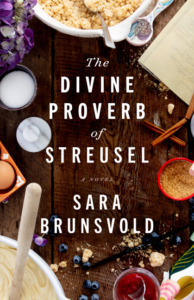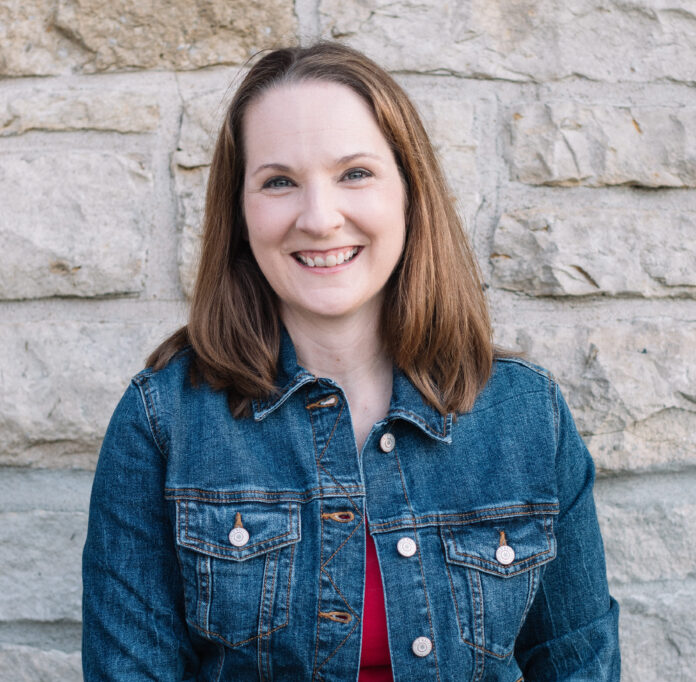Today, we welcome author Sara Brunsvold to the blog. Sara will be talking about her latest release THE DIVINE PROVERB OF STREUSEL.
First, give our readers a look inside The Divine Proverb of Steusel.
The Divine Proverb of Streusel follows Nikki Werner as she escapes to her uncle’s small Missouri farm amid an unfolding family crisis, hoping to find a way to piece her life back together. She finds solace in cooking her way through her great-grandmother’s German recipes. What starts as a reprieve, however, turns into an avenue for her to discover a family history she never knew, helped along by Uncle Wes and his tight-knit community. The more she learns about her heritage and her family’s past, the more the path forward comes into view—including with her estranged father. This book is a deeply personal one, as it draws from my own family story.
What do you hope readers will gain from reading The Divine Proverb of Streusel?
I hope readers will come away from their time in Eddner, Missouri, with an inspiration to discover their own roots and, above all, a renewed hope in the power of forgiveness.
What inspired the idea of a handwritten cookbook infused with proverbs?
The notebook Nikki finds was the author’s attempt to preserve their shared heritage, which included both food and faith. This idea of using the written form to pass down what matters to the next generation was apparently popular among German immigrants in the early 1900s. During my research, I came across a family biography by a local reporter who wrote about his grandmother’s self-described “common book,” which was a simple notebook in which she captured life lessons for her children. Then, as I was going through my own family artifacts, I found an antique Webster’s composition notebook filled with periodical clippings that featured inspirational poems, wise sayings, and hymn lyrics. Some clippings were in English and some in German. I don’t know who in the family line compiled the notebook, but I treasure it and used it as a physical model for the one Nikki discovers.
What about your own background influenced Nikki’s story?
German immigrant ancestors and a farming community are part of my background too. Most notably, though, I also was a young adult when my parents’ marriage dissolved. No matter how old the children are, divorce is traumatic. I struggled with resentment toward my dad in the aftermath. I also wrestled with faith in general during this time. God used a number of means—family members, older women, sermons, songs on the radio—to surround me with the truth of what resentment does to a person. Like Nikki, I had to make a choice: vindication or the chance to have lasting peace. From the start, I wanted this book
to be my praise song to my gracious heavenly Father for what he did in, around, and through me (and my family) during that pivotal time.
Do you have a favorite character in The Divine Proverb of Streusel?
Nikki’s uncle, Wes, captured my imagination the most as I was writing, and he still does. Part of the story is told from his perspective, and goodness, if he isn’t the epitome of the German-descent farmers I grew up around. Stoic and humble, duty and honor bound. A man of few words. That’s what I commonly saw of the men both in my family and in our Missouri farm community. Hidden inside, though, Wes has all these layers of reactions and emotions. He is a man who questions if he is all he is meant to be, a man who misses his late mother’s affectionate smiles, a man whose protective instincts are strong though sometimes misplaced. He’s the kind of character who reminds me of men I have known and makes me wish everyone could have someone just like him in their lives.
What is your favorite recipe that appears in The Divine Proverb of Streusel?
Frikadellen, a German version of hamburgers, quickly became a family favorite, as did the German-style scalloped potatoes. But I’m most thrilled to offer up to readers a recipe for scalloped cabbage, straight from my great-grandma Lehenbauer’s collection. While not traditional fare, it incorporates German sensibilities for butter and cabbage. It was hands down my favorite dish growing up.
What is your favorite proverb from The Divine Proverb of Streusel, and what does it mean to you?
I have to go with the proverb for streuselkuchen, from which the book title is derived. “Streusel” comes from the German verb “streuen,” which means “to scatter.” That’s what you do with streusel—you scatter the buttery crumbles across the top of the kuchen (cake) dough. The biblical concept of sowing seeds comes into play in the proverb for the recipe. The streusel crumbles represent the seeds in the sower’s palm. The proverb creates a beautiful image in my mind based on this concept. That’s all I can say without giving too much away.
What draws you to writing about interpersonal relationships?
Nothing stretches us more, draws us to places we never thought we’d have the courage to go, or demands all of our being like learning to love others well. It is the single greatest adventure to which we all have equal access and the same calling.
How can readers connect with you?
I hope they do connect with me! On my website, SaraBrunsvold.com, I offer the recipe for streuselkuchen used in the book. I’m also on Instagram @Sara_Brunsvold and Facebook @SaraBrunsvoldAuthor.
Where can readers purchase a copy of The Divine Proverb of Streusel?
The Divine Proverb of Streusel is available wherever books and ebooks are sold.
Sara, thank you so much for joining us today. Dear readers, The Divine Proverb of Streusel releases tomorrow. Here’s a quick look:::::
 Shaken by her parents’ divorce and discouraged by the growing chasm between herself and her serious boyfriend, Nikki Werner seeks solace at her uncle’s farm in a small Missouri hamlet. She’ll spend the summer there, picking up the pieces of her shattered present so she can plan a better future. But what awaits her at the ancestral farm is a past she barely knows.
Shaken by her parents’ divorce and discouraged by the growing chasm between herself and her serious boyfriend, Nikki Werner seeks solace at her uncle’s farm in a small Missouri hamlet. She’ll spend the summer there, picking up the pieces of her shattered present so she can plan a better future. But what awaits her at the ancestral farm is a past she barely knows.
Among her late grandmother’s belongings, Nikki finds an old notebook filled with handwritten German recipes and wise sayings pulled from the book of Proverbs. With each recipe she makes, she invites locals to the family table to hear their stories about the town’s history, her ancestors–and her estranged father.
What started as a cathartic way to connect to her heritage soon becomes the means through which she learns how the women before her endured–with the help of their cooking prowess. Nikki realizes how delicious streusel with a healthy dollop of faith can serve as a guide to heal wounds of the past.






